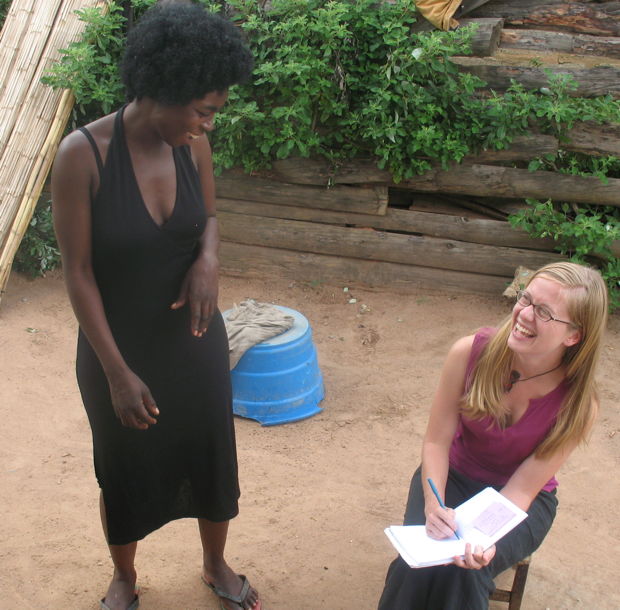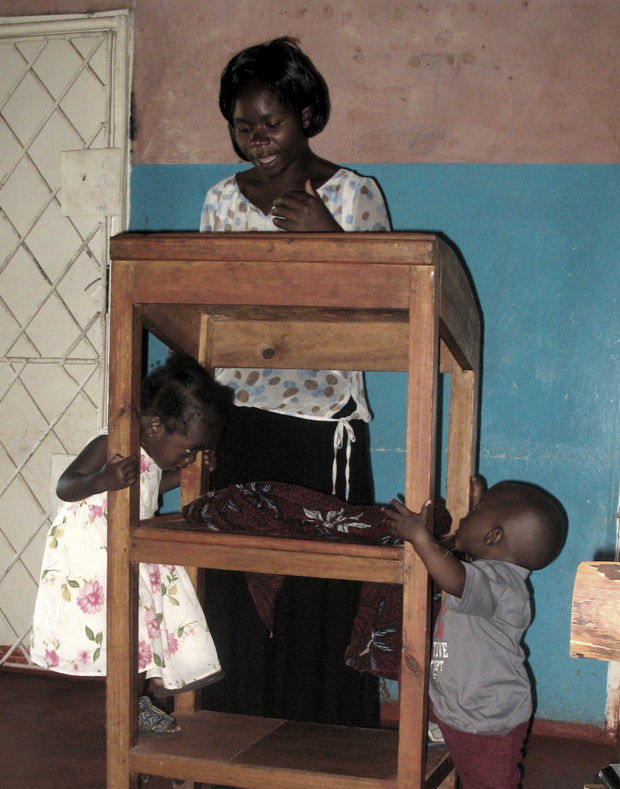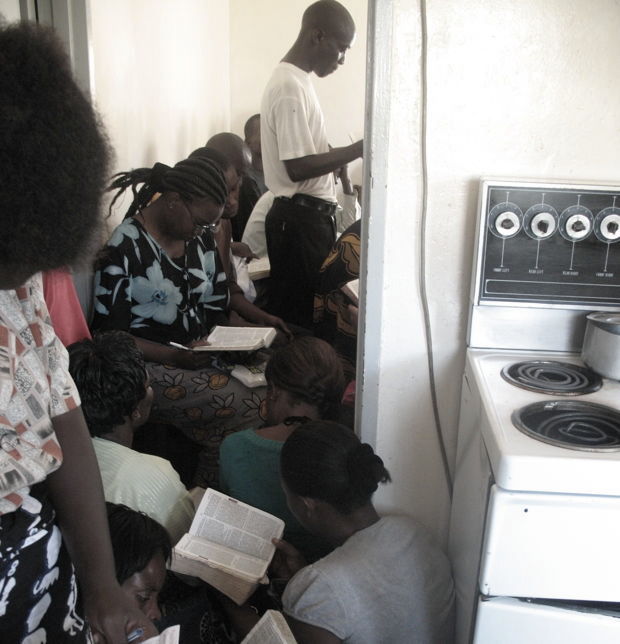In just a few days it will have been a year since I finished my fieldwork in Zambia and returned to the States to write my dissertation. After eighteen months spent studying Pentecostal churches in an urban mining community, I’m now back to passing days at my desk in California. Even surrounded by reams of fieldnotes, it’s hard to connect with the energy of the Zambian churches that I’ve worked alongside for seven years, first as a missionary and now as an ethnographer. In contemplating the mystical link that I know I have to believers all those thousands of miles away, Luke’s collected stories in the book of Acts have taken on new significance.
Church historian Andrew F. Walls understood this well. What first inspired Walls to write about culture was his experience as a young man teaching early church history in Sierra Leone. Not long after he began instructing his West African students, he realized the connection between the course material and the experience of the Christians in his classes: “I still remember the force with which one day the realization struck me that I, while happily pontificating on that patchwork quilt of diverse fragments that constitutes second-century Christian literature, was actually living in a second-century church.”
Walls’ revelation, if taken seriously, is a powerful commentary on the book of Acts. If he is right, then an engagement with recently converted communities has much to tell us about the first believers. Luke’s stories of the apostles highlight several themes, among them Christian unity and the inevitability of persecution. Beyond these important ideas, though, what I’d like to emphasize in comparing early Christianity in the Roman Empire to early Christianity in sub-Saharan Africa is the cultural process of conversion, the ongoing negotiation of Christian faith. The long narrative thread that connects the stories of believers from Jerusalem to Macedonia to Rome is the particular working out of what it means to be a Christian. At every turn there is a new question: What should believers eat? How should they relate to their neighbors? Who should they marry? Throughout the New Testament epistles we read many of the answers to these questions, but it is in Acts that the process of asking is most clear.

The deeper people go in Christian faith the more cultural questions they ask, and in Scripture we never see believers abandon that task. A quick glance though history and across the globe reveals that the process of Christian conversion remains remarkably similar. Missionary memoirs, theological treatises, and believers’ biographies all speak to the reorienting work of the gospel. Now, as in Acts, conversion brings a reexamination of culture. When people come to Christ it is their task to tease out the way that transformation maps onto their marriages and families, their position in the economy and role in politics.
This process has been made clear to me throughout my years working with Zambian believers. One of the best examples of it came through a neighbor in my field site, who I will call Bana Ilunga (in Zambia, as in much of Southern Africa, people are routinely called by the names of their children; here, Bana Ilunga would be Ilunga’s mother). Bana Ilunga is short, round, and formidable. She is a descendant of the royal family of one of the largest tribes in Zambia and was among the first women ordained by the largest Pentecostal denomination in the country.
On one August afternoon, just as the days were beginning to get hot, I made my way over the rutted street to Bana Ilunga’s house. I had some questions that I wanted to ask her about an experience we had shared the week before. Over the course of several days I had sat curled in the corner of a living room while Bana Ilunga and a number of other senior Christian women trained a girl my age for marriage, using traditional proverbs and practices, as well as biblical teaching. This process was intense by any metric, but made more so because, in the light of worries about syncretism, rites like these have long been the subject of debate among African believers. Today, a little over a century after Christianity was first brought to Zambia, some churches do not allow young women to be trained at all. Others invite instruction from fellow believers like Bana Ilunga, who are sure to combine Christian themes with traditional training. Still others turn a blind eye when, under pressure from her extended family, a girl chooses to participate in ceremonies or training practices that the church has clearly condemned.

I wanted to know what Bana Ilunga thought about all of this, so I stood in the sun at the edge of her yard and called out, ‘Odi,’ asking to enter. Bana Ilunga was sitting outside on a reed mat carefully positioned in the small sliver of shade provided by her neighbor’s cinderblock wall. She returned my greeting and welcomed me into the yard, where I sank down beside her, grateful for a chance to remove my floppy sunhat and for the cool concrete at my back. After some small talk I got down to business: Surely Bana Ilunga was aware of the various opinions on how young women ought to be trained. How did she, as a Christian, negotiate the question of what was and was not appropriate in this regard?
This was clearly not the first time that Bana Ilunga had thought about the issue, and she responded to my questions using the same style of metaphor she employs to instruct Pentecostal brides. “In my house I have a sieve,” she began. “Just as I sift pounded groundnuts or cassava to use at home I must also sift my traditions using God’s Word.” In other words, like so many who have gone before, Bana Ilunga is working out her conversion, taking what those around her have always thought to be true and the way they have always lived and pushing it through the sieve of the gospel. Her experience is helpful for us because it sheds light on the ongoing process of conversion, on the work of the book of Acts. When we read about the Jerusalem council or Paul’s sermon at Athens we see the slow, everyday negotiation of what it means to be Christ’s people. In Bana Ilunga’s story we have this picture again. Her experience brings conversion close in a way that I believe is crucial to the spiritual life of the western church.
Living in a social context that has been vitally shaped by Christianity, we in the West don’t often find ourselves in situations in which we are made to think in terms of our whole community’s conversion, our culture’s orientation toward the gospel. However, despite those aspects of western society that have clearly been structured by Christianity — our conceptions of personhood, for example, or of sincerity — we continue to be faced with social transformations that require a supple, sensitive faith. When confronted with the nuances of twenty-first century public life, western believers together would do well to borrow Bana Ilunga’s sieve.

As our culture continues to evolve and present us with new things to which we, as a community of believers, must respond, may we remember the gift we have been given not only in Scripture, but also in the witness of the African church. When Walls writes that the “crowning excitement” of our era in church history is the possibility that believers from various parts of the world are able to read the Bible together, he is describing the way that the unique cultural experiences of different Christians are able to illuminate Scripture. I know when I read the stories of the first believers in the book of Acts that their task is my own, that I am called to act within my culture to turn it towards the gospel. But the precise nature of that task, the flesh and blood work of it, is made most clear in my relationship with people like Bana Ilunga. Recently converted communities stand in the midst of the Body of Christ and speak to all of us about the ongoing mission inaugurated by the first believers. I am increasingly thankful for this witness, this voice; God, in his mercy, has not left his people without prophets.
Today, stateside once more, circulating between my desk and the library, I have begun to miss passing my days in long prayer meetings or getting lost on the serpentine streets of the township. Zambia feels far away. However, I know that in Christ’s body I am bound up with people like Bana Ilunga, yoked together in a long line of believers continuing the witness of the book of Acts. In this good work, we are united across time and space in a common mission, “that now, through the church, the manifold wisdom of God should be made known to the rulers and authorities in the heavenly realms” (Ephesians 3:10).
May God, through his grace, give us the strength to listen to and learn from voices from the rest of the church. And may he, by his power, clear a path for those voices to be heard.